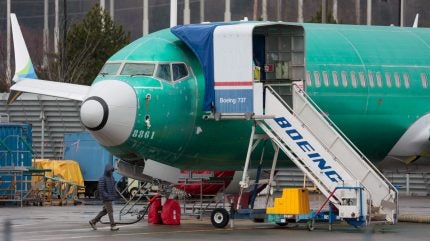
The acting head of the European Union Aviation Safety Agency (EASA) has said the regulator could end its recognition of US approvals for Boeing aircraft amid ongoing concerns about quality control at the company.
Luc Tytgat, the acting executive director of the EU’s regulatory body, said that EASA would stop recognising its US counterpart’s approval “if need be” as criticism mounts about the US manufacturer’s safety and quality control culture after an incident involving a door plug blow out of a 737 MAX 9 plane in January.
During an interview with Reuters, Tytgat said that while no action on the issue was imminent, “all the tools must be implementable as soon as we see the justification or situation that requires us to take appropriate measures.”
Under the EASA’s pact with the Federal Aviation Administration (FAA), the European regulator approves aircraft manufactured by France’s Airbus while the FAA approves the safety of Boeing’s planes, and each organisation recognises the work of the other.
However, either regulator is able to call for consultations if it disagrees with the work of the other, which can lead to the suspension of recognition if they fail to resolve the issue.
Tytgat said that he has spoken to Boeing representatives and has “seen a change in the management” to put more emphasis on quality control, adding he didn’t see why the manufacturer’s certification would not be maintained at the moment.
How well do you really know your competitors?
Access the most comprehensive Company Profiles on the market, powered by GlobalData. Save hours of research. Gain competitive edge.

Thank you!
Your download email will arrive shortly
Not ready to buy yet? Download a free sample
We are confident about the unique quality of our Company Profiles. However, we want you to make the most beneficial decision for your business, so we offer a free sample that you can download by submitting the below form
By GlobalDataWhen pushed on what could lead the EASA to change its mind about the current set up, Tytgat said that for him it would be more fatal crashes like the two involving Boeing’s 737 MAX 8 model in 2018 and 2019 that lead the FAA to change its certification policies.
While the January blow out incident did not result in any serious injuries, though experts warned a passenger could have been ripped out the plane if they were seated by the door plug, subsequent investigations by the FAA and the US National Transportation Safety Board (NTSB) have found a series of issues at Boeing.
The NTSB’s preliminary report found that the door plug involved in the incident was likely missing bolts when it left Boeing’s factory and the FAA has described the safety culture at Boeing as “inadequate” and failed more than a third of tests conducted during an audit of 737 MAX production.



